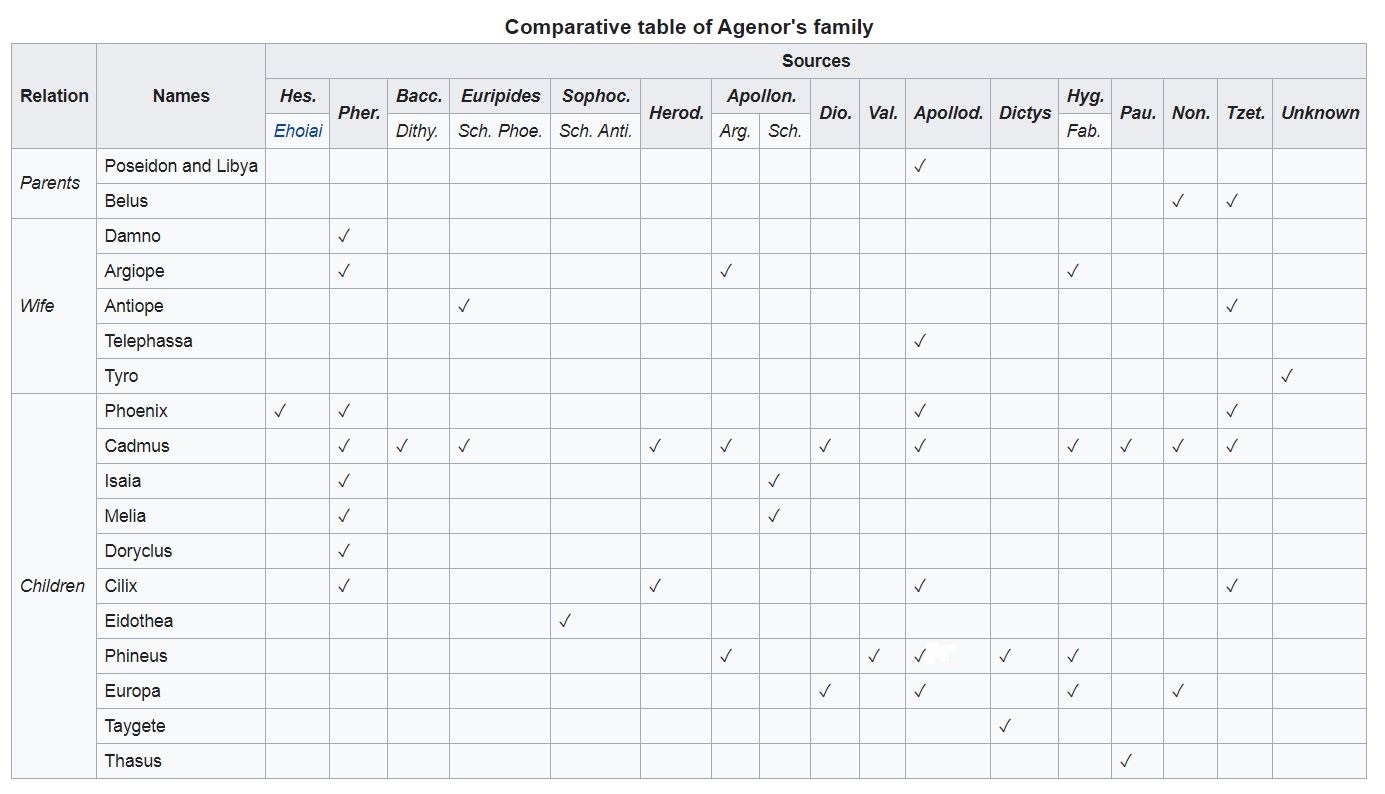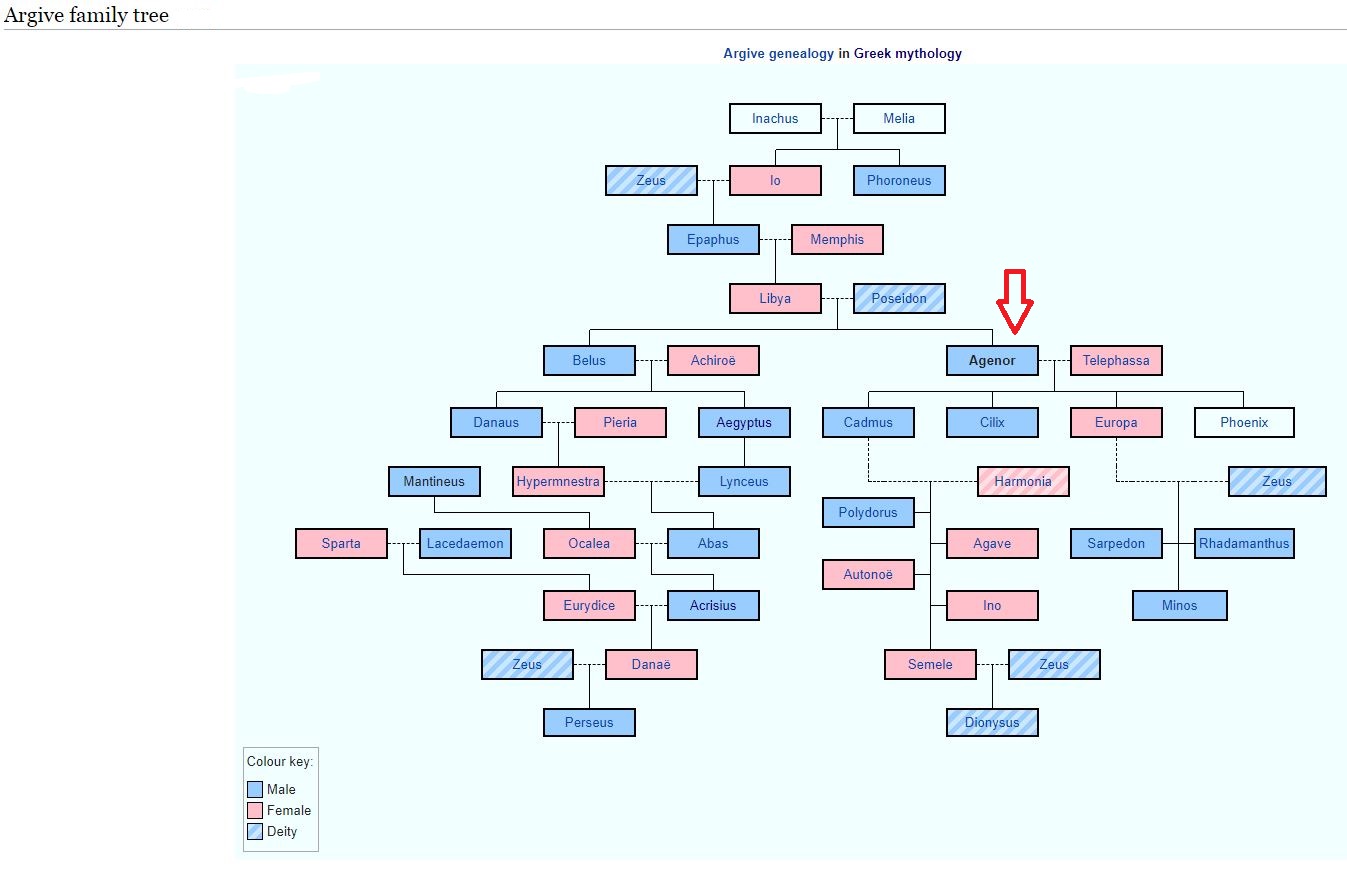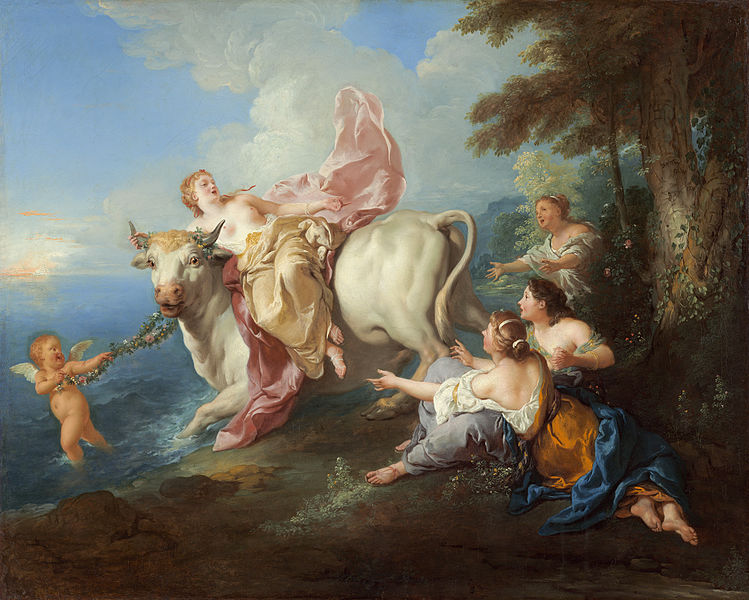Agenor king of Tyre
Agenor (Ancient Greek: Ἀγήνωρ; translates as: 'heroic, manly') was in Greek mythology and history a Phoenician king of Tyre.
Herodotus estimates that Agenor lived sometime before the year 2000 BC.
Family
According to Apollodorus, Agenor was born in Memphis of Egypt to Poseidon and Libya and he had a twin brother named Belus. Belus remained in Egypt and reigned over Egypt, while Agenor departed to Phoenicia and reigned there. According to other sources, he was the son of Belus, and possibly Achiroe.
Sources differ also as to Agenor's children; he is sometimes said to have been the father of Cadmus, Europa, Cilix, Phoenix, and Thasus. Some sources state that Phoenix was Agenor's brother (and Belus's son); and it was Phoenix who was the father of these individuals. Agenor's wife is variously given as Telephassa, Argiope, Antiope, and Tyro, with the latter giving her name to the city of Tyre. According to Pherecydes of Athens, Agenor's first wife was Damno, daughter of Belus, who bore him Phoenix and two otherwise unknown daughters, Isaia and Melia, who married Aegyptus and Danaus respectively; Agenor then fathered Cadmus with Argiope, daughter of Neilus.
In the Iliad, however, Europa is clearly a daughter of Phoenix. Either Cadmus or Europa are confirmed as children of Phoenix by the Ehoeae attributed to Hesiod and by Bacchylides and by various scholia. Cilix and Phineus are also sons of Phoenix according to Pherecydes, who also adds an otherwise unknown son named Doryclus.
Most later sources list Cadmus and Cilix as sons of Agenor directly without mentioning Phoenix. On the rare occasions when he is mentioned, Phoenix is listed as the brother of Cadmus and Cilix. Whether he is included as a brother of Agenor or as a son, his role in mythology is limited to inheriting his father's kingdom and to becoming the eponym of the Phoenicians. All accounts agree on a Phoenician king who has several children, including the two sons named Cadmus and Cilix and a daughter named Europa.
A certain Eidothea, wife of Phineus, was called the sister of Cadmus and thus maybe the daughter of Agenor. Taygete, usually one of the Pleiades and mother of Lacedemon by Zeus was also said to be the daughter of Agenor.


Mythology
Zeus saw Agenor's daughter Europa gathering flowers and immediately fell in love with her. Zeus transformed himself into a white bull and carried Europa away to the island of Crete. He then revealed his true identity and Europa became the first queen of Crete. Agenor, meanwhile, sent Europa's brothers, Cadmus and Cilix in search of her, telling them not to return without her. In some versions of the tale, Agenor sends her other brothers as well: Phineus or Thasus (and of course Phoenix in the versions in which Cadmus's father is Agenor).
As Europa could not be found, none of the brothers returned. Cadmus consulted the oracle of Delphi and was advised to travel until encountering a cow. He was to follow this cow and to found a city where the cow would lie down; this city became Thebes. Cilix searched for her and settled down in Asia Minor. The land was called Cilicia after him.
The other "Agenor"
Agenor, son of Poseidon and king of Tyre.
Agenor of Argos, son of either Ecbasus, Triopas, or Phoroneus.
Agenor, one of the Sons of Aegyptus. He married the Danaid Cleopatra or Evippe and thus was killed along with his brothers, except Lynceus, by their wives during their wedding night at the behest of Danaus.
Agenor, the betrothed of Andromeda, otherwise called Phineus.
Agenor (son of Pleuron), and grandson of Aetolus.
Agenor, one of the Niobids.
Agenor, a warrior in the army of the Seven Against Thebes. For trying to rescue Tages, his brother, who had been wounded in battle by Hypseus in the river, Agenor eventually was drowned.
Agenor, son of Phegeus, murderer of Alcmaeon.
Agenor, son of Antenor, a character in Homer's Iliad.
Agenor, one of the suitors of Penelope from Dulichium.
Agenor, another suitor of Penelope from Zacynthos.
Agenor, son Areus, son of Ampyx. He was the father of Preugenes and paternal grandfather of Patreus, the founder of Patrae.
Agenor, husband of Dioxippe and father of Sipylus, who unwittingly killed his mother.

Sources
Schmitz, Leonhard (1867). "Agenor (1)". In Smith, William (ed.). Dictionary of Greek and Roman Biography and Mythology. 1. Boston: Little, Brown and Company. p. 68.
Herodotus, Histories 2.145.1
Pseudo-Apollodorus, Bibliotheca 2.1.4
Nonnus, Dionysiaca, 3. 296-297
Scholiast on Euripides Phoenician Women 5
Hyginus, Fabulae 178
Pausanias, Graeciae Descriptio 5.25.7
Scholiast on Apollonius of Rhodes, Argonautica 2.178 & 3.1186
Herodotus, The Histories 4.147 & 7.91
Tzetzes, Chiliades 7.19
Hyginus, Fabulae 6 & 178
Gantz, p. 208; Pherecydes fr. 21 Fowler 2000, p. 289 = FGrHist 3 F 21 = Scholia on Apollonius Rhodius, Argonautica 3.1177-87f
Scholia on Euripides, Phoenician Women 5
Gomme, A. W. (1913). "The Legend of Cadmus and the Logographoi". JHS: 70.
Homer, Iliad 14.321–22
Hesiod, Ehoiai 19a as cited in Oxyrhynchus Papyri 1358 fr. 1
Hesiod, Ehoiai 19 as cited in Scholiast on Homer, Iliad 12.292
Bacchylides, Dithyrambs 5.46
Pherecydes fr. 86 Fowler 2000, p. 320 = FGrHist 3 F 86.
Scholia on Sophocles, Antigone 989
Sir Richard C. Jebb. Commentary on Sophocles: Antigone, 966
Dictys Cretensis, Trojan War Chronicle 1.9
Pseudo-Apollodorus, Bibliotheca 3.1.1
Virgil, Aeneid 1.338
Raleigh, Walter; William Oldys (ed.) (1829). The Works of Sir Walter Raleigh. The University press. pp. 224, 274–278.
"Wikipedia"













